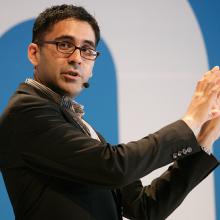Three ways churches can decenter themselves and economically empower their communities.
moral economy

Image via REUTERS/Stefano Rellandini/RNS
In the end, Bernie Sanders got something almost as good as a picture with Pope Francis: blanket international news coverage and a chance to deliver his stump speech wrapped in the words of the pontiff, one of the most popular leaders on the planet.
Oh, and, rumor had it, a sleepover in the pope’s own Vatican guest house.

Photo via R. Gino Santa Maria / Shutterstock
"The Church’s social teachings, stretching back to the first modern encyclical about the industrial economy, Rerum Novarum in 1891, to Centesimus Annus, to Pope Francis’s inspiring encyclical Laudato Si’ this past year, have grappled with the challenges of the market economy. There are few places in modern thought that rival the depth and insight of the Church’s moral teachings on the market economy."

Image via R. Gino Santa Maria / Shutterstock.com
Pope Francis is not expected to grant an audience to Democratic presidential candidate Bernie Sanders in Rome this week, dashing hopes that the U.S. senator could win the backing of the popular pontiff — or at least the most coveted photo-op on the planet.

Umair Haque speaking at the 2009 NEXT conference in Berlin. Via Wylio http://bit.ly/AugRQB
If you’re on Twitter, you may well have a few people that you follow with such enthusiasm that it occasionally feels a little like you’re stalking them. You re-tweet every article they post, nod along with every inspiring tweet they type and include them in your Follow Friday list every week.
Even if that’s not true for you, it’s certainly true for me of one person in particular — Umair Haque.
Haque is a self-titled “author, blogger, thinker, reformer.” But the more I read of his work, the more inclined I am to add the title “prophet” to that list of descriptors.
Haque is a prophet in the sense that he is preaching a message that is for a specific group of people (those who are disenfranchised but not quite cynical enough to give up yet) at a specific point in time (now, in a time of economic malaise). His words cut right to the heart of what has been going wrong in our world, and they are words that many, many people need to hear.
So it was with great relish that I purchased his new digital book, Betterness: Economics for Humans, excited to hear these words.
On Nov. 30, at Gordon College in Wenham, Mass., Sojourners CEO Jim Wallis and Arthur Brooks of the American Enterprise Institute, debated the question, "Is Free Enterprise Moral?"
The event was sponsored by the Center for Christian Studies and the Jerusalem and Athens Forum at Gordon as part of the college's ongoing "Faith Seeking Understanding" lecture series.
Watch complete video of the debate inside...
It’s time for people of faith to get up off the couch, out of the pews, and MOBILIZE!
THIS WEDNESDAY Sojourners and other groups in support of the Circle of Protection will coordinate Human Circles of Protection, a national effort by people faith to show congress and the world that Jesus followers want an America where our credo is bond: liberty and justice for all!
It's a clear sign something's wrong when talks on "free trade" turn an island paradise into an armed camp.
Hawaii is on lockdown this week while the U.S. tries to hammer out a regional trade agreement that's being called "NAFTA for the Pacific." While some mean this as a compliment, Hawaii's faith and labor leaders are lifting their voices against an agreement they believe will put profits for banks and corporations above workers' rights, indigenous culture, and local communities. Those leaders are drawing on the Pacific region's indigenous "Coconut Theology" to provide an alternative vision of the common good.
"Coconut Theology came out of our contextual understanding of the Gospel in the Pacific," said Rev. Piula Alailima, pastor of Wesley Methodist Church in Honolulu and a core leader in the community organizing group Faith Action for Community Equity (FACE). "When we break the body of the coconut and partake of the juice, it's a symbol of the body and blood of Christ, of sacrifice, of community and the common good."
Occupy Wall Sreet, false idols and a moral economy. Breaking the cycle of poverty. Poorest poor in U.S. hits a new record: 1 in 15 people. As poverty deepens, giving to the poor declines. Arianna Huffington: Shakespeare, the Bible and America's shift into a punitive society. Peaceful Occupy Oakland march followed by late-night clashes.
You have awakened the sleeping giant, too long dormant, but ever present, deep in the American democratic spirit. You have given voice and space to the unspoken feelings of countless others about something that has gone terribly wrong in our society. And you have sparked a flame from the embers of both frustration and hope that have been building, steadily, in the hearts of so many of us for quite some time.
Throughout history, often it has been left to the youth of a society to do that, and you boldly have stepped into the role of the emerging generation, which sometimes means saying and doing what others only think. You have articulated, loudly and clearly, the internal monologue of a nation.



